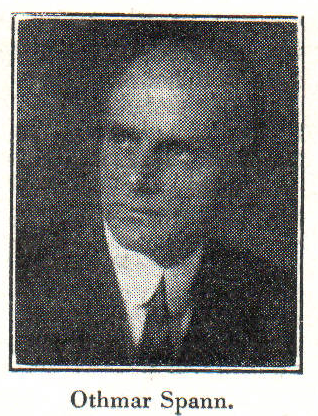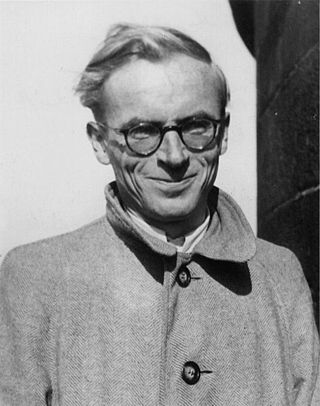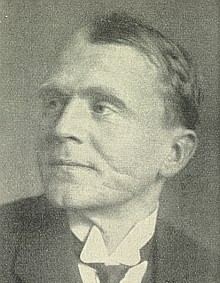Related Research Articles

Carl Philipp Emanuel Bach, also formerly spelled Karl Philipp Emmanuel Bach, and commonly abbreviated C. P. E. Bach, was a German Classical period composer and musician, the fifth child and second surviving son of Johann Sebastian Bach and Maria Barbara Bach.

Othmar Spann was a conservative Austrian philosopher, sociologist and economist. His radical anti-liberal and anti-socialist views, based on early 19th century Romantic ideas expressed by Adam Müller et al. and popularized in his books and lecture courses, helped antagonise political factions in Austria during the interwar years.

Erhard Busek was an Austrian politician from the Christian-conservative People's Party (ÖVP). Throughout his political career, he was widely regarded as one of the leaders of the party's liberal wing. He was coordinator of the South-Eastern Cooperative Initiative (SECI) and chairman of the Institute for the Danube Region and Central Europe.

August Hugo Distler was a German organist, choral conductor, teacher and composer.

Robert Hohlbaum was an Austrian-German librarian, writer, and playwright. He was born as a son of an industrialist Alois Hohlbaum in what is now Krnov in the Czech Republic, then part of the Austro-Hungarian Empire and known by its German name, Jägerndorf.
oscR miLanI, is an Argentine musician. A Bariloche Foundation scholarship holder, he went to Buenos Aires to specialize; harpsichord, chamber music, and interpretation on early keyboard instruments. His activities as a soloist and chamber musician with the Camerata Bariloche took him to several countries of South America and also to Europe. He has made recordings for the ORF and Picks Records.

Alfred Maria Willner was an Austrian writer, philosopher, musicologist, composer and librettist.

Johann Ernst Bach was a German composer of the Classical Period. He was the son of Johann Bernhard Bach.
Johann Georg Stauffer was an Austrian luthier and the most important Viennese luthier of his time.

Johann Michael Ekling was an Austrian mechanic and inventor of scientific apparatuses and instruments.

The orchestral Dance Suite from Keyboard Pieces by François Couperin, TrV 245 was composed by Richard Strauss in 1923 and consists of eight movements, each one based on a selection of pieces from François Couperin's Pièces de Clavecin written for the solo harpsichord over the period 1713 to 1730. It is also sometimes referred to as simply The Couperin Suite.
The Telemann-Werke-Verzeichnis, abbreviated TWV, is the numbering system identifying compositions by Georg Philipp Telemann, published by musicologist Martin Ruhnke.

Erich Schenk was an Austrian musicologist and music historian.
Fritz Walden, real name Friedrich Drobilitsch, also Fritz Drobilitsch-Walden and Franz Drobilitsch, was an Austrian publicist, author and cultural editor as well as film, literature, music and theatre critic.
Robert Streibel is an Austrian historian, writer and poet.
Michael Lessky is an Austrian conductor.
Johann Trnka was a convicted murderer who was the last person to be sentenced to death and executed in Austria.

The Libraries in Vienna are a network of libraries which are managed by the city of Vienna. They are mainly concerned with enabling broad public education, whilst the also city owns Wienbibliothek im Rathaus, which focuses on scientific work.
Friedrich Weissensteiner was an Austrian historian and writer.
References
- ↑ Prof. Johann Sonnleitner on Desponds.com (in German)
- ↑ Johann Sonnleitner on Universität Wien
- ↑ Johann Sonnleitner - Fortepiano. In web presence of On the road with Mozart.
- ↑ Clemens-Christoph von Gleich on Wayback Machine, web presence of the publisher Freies Geistesleben
- ↑ Die Geschäfte des Herrn Robert Hohlbaum die Schriftstellerkarriere eines Österreichers in der Zwischenkriegszeit und im Dritten Reich on WorldCat
- ↑ Entwicklungsplanung für ein kooperatives System der Erwachsenenbildung in Österreich Projekt 12. Entwicklungsplan für Öffentliche Büchereien / von Johann Sonnleitner. [Projektträger: Büchereiverband Österreichs] on WorldCat